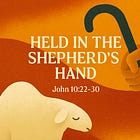Held in the Shepherd’s Hand
John 10:22–30
Opening Reflection
There are days when the noise of life makes it hard to hear anything at all—let alone the voice of God. When doubt creeps in, when your prayers feel unanswered, when belonging feels fragile or fading, it’s tempting to wonder: Am I still held? Am I still known?
Jesus speaks into that ache.
He doesn’t offer a lecture or a theological checklist. He simply says: My sheep listen. I know them. They follow. I hold them.
This is not a transactional relationship. This is belonging born of love. The Good Shepherd doesn’t abandon the anxious, the unsure, or the wandering. He calls to us—even when we’re unsure it’s his voice. He holds us—even when we forget how to hold on.
Context
Literary Setting: This moment follows Jesus’ teaching on being the Good Shepherd (John 10:1–21). Now, at the Festival of Dedication (Hanukkah), religious leaders confront him again, pressing him to declare his identity.
Historical Setting: It’s winter in Jerusalem, both literally and metaphorically. The Festival of Dedication remembers the rededication of the temple after its desecration (Maccabean revolt). Tensions are high, both politically and religiously.
Theological Frame: Jesus’ words echo Psalm 23 and Ezekiel 34—God as the true Shepherd who rescues, gathers, and protects. His claim to unity with the Father and his role as the Shepherd is both comforting and provocative.
Read the Passage
John 10:22–30 (NLT)
22 It was now winter, and Jesus was in Jerusalem at the time of Hanukkah, the Festival of Dedication.
23 He was in the Temple, walking through the section known as Solomon’s Colonnade.
24 The people surrounded him and asked, “How long are you going to keep us in suspense? If you are the Messiah, tell us plainly.”
25 Jesus replied, “I have already told you, and you don’t believe me. The proof is the work I do in my Father’s name.
26 But you don’t believe me because you are not my sheep.
27 My sheep listen to my voice; I know them, and they follow me.
28 I give them eternal life, and they will never perish. No one can snatch them away from me,
29 for my Father has given them to me, and he is more powerful than anyone else. No one can snatch them from the Father’s hand.
30 The Father and I are one.”
Key Insights
Jesus Speaks to Our Deepest Desire: Belonging - The crowd wants clarity, but Jesus offers something better: connection. He doesn’t argue. He speaks of relationship, of being known and held. This isn’t just about belief; it’s about being known and claimed.
We Are Known, Not Just Numbered - Jesus says, “My sheep listen to my voice; I know them, and they follow me.” This isn’t about blind obedience, it’s about relationship. The Good Shepherd doesn’t count us like inventory; he knows us, deeply, personally, intimately. In a world where it’s easy to feel lost in the crowd or reduced to roles, titles, or performances, Jesus offers something different: belonging rooted in love, not achievement.
Jesus Embodies Divine Oneness Through Love - “The Father and I are one.” This isn’t abstract theology. It’s the radical claim that Jesus fully reveals God, through voice, care, and steadfast presence. To know Jesus is to know the heart of God.
Guiding Question
Where in your life do you need to be reminded that you are already known, already held, and already loved?










